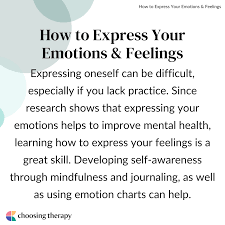
Unleashing the Power of Self-Expression: Embracing Your Voice
The Power of Expressing Yourself: Why Your Voice Matters
Expression is a fundamental aspect of human communication and connection. Whether through words, art, music, or actions, expressing oneself is a powerful way to convey thoughts, emotions, and experiences. It allows us to connect with others on a deeper level, share our unique perspectives, and contribute to the rich tapestry of human expression.
When we express ourselves authentically, we not only communicate our individuality but also foster understanding and empathy. Our voices have the ability to inspire, provoke change, and create meaningful connections with those around us. By sharing our stories and perspectives, we contribute to the collective narrative of humanity.
Expressing yourself can take many forms. It can be as simple as speaking your truth in a conversation or as complex as creating a work of art that speaks volumes without words. The key is to find ways to express yourself that resonate with your innermost thoughts and feelings.
It’s important to remember that your voice matters. Your experiences, insights, and emotions are valid and deserve to be heard. By expressing yourself openly and honestly, you not only empower yourself but also inspire others to do the same.
So whether you choose to write poetry, sing a song, paint a picture, or simply speak your mind – embrace the power of expression. Let your voice be heard and know that it has the potential to make a difference in the world.
Exploring Self-Expression: Answers to Common Questions
- What are different ways to express yourself?
- Why is self-expression important?
- How can I overcome barriers to expressing myself?
- What role does art play in self-expression?
- How does culture influence the way we express ourselves?
- What are the benefits of expressing your emotions?
What are different ways to express yourself?
There are countless ways to express yourself, each as unique as the individual doing the expressing. From writing poetry and creating art to dancing, singing, or even engaging in meaningful conversations, the avenues for self-expression are diverse and endless. Some people find solace in journaling their thoughts, while others channel their emotions through music or physical activities like sports. Whether through fashion choices, cooking, volunteering, or simply being present and listening attentively, every action and interaction can be a form of self-expression. The key is to explore different outlets and find what resonates most authentically with your inner self.
Why is self-expression important?
Self-expression is important because it allows individuals to communicate their thoughts, emotions, and experiences in a way that is unique to them. By expressing themselves authentically, people can assert their individuality, build self-confidence, and establish meaningful connections with others. Self-expression also plays a crucial role in personal growth and emotional well-being, as it provides an outlet for creativity, stress relief, and self-discovery. Ultimately, embracing self-expression empowers individuals to share their stories, perspectives, and values with the world, contributing to a more diverse and interconnected society.
How can I overcome barriers to expressing myself?
Overcoming barriers to expressing oneself can be a transformative journey towards self-discovery and empowerment. One effective way to break through these obstacles is by cultivating self-awareness and understanding the root causes of your hesitations or fears. By acknowledging and accepting your emotions, thoughts, and vulnerabilities, you can gradually build the confidence to share your authentic self with others. Additionally, seeking support from trusted friends, mentors, or mental health professionals can provide valuable guidance and encouragement as you navigate the process of self-expression. Remember that it’s okay to start small and take gradual steps towards opening up – each moment of vulnerability is a step towards embracing your true voice and fostering meaningful connections with those around you.
What role does art play in self-expression?
Art plays a pivotal role in self-expression by providing a creative outlet for individuals to convey their thoughts, emotions, and experiences in a visual and tangible form. Through various artistic mediums such as painting, sculpture, music, dance, and more, individuals can communicate complex ideas that may be difficult to articulate through words alone. Art allows for a deeper exploration of one’s inner world, enabling personal growth, healing, and self-discovery. By engaging in artistic expression, individuals can share their unique perspectives with the world, fostering connections and understanding across diverse communities. Art serves as a powerful tool for self-reflection and communication, empowering individuals to express themselves authentically and meaningfully.
How does culture influence the way we express ourselves?
Culture plays a significant role in shaping the way we express ourselves. It influences our language, communication styles, customs, and social norms, all of which impact how we convey our thoughts and emotions. Cultural beliefs and values often dictate what is considered appropriate or acceptable in terms of expression, leading individuals to express themselves in ways that align with their cultural background. Additionally, cultural diversity enriches our expressive abilities by introducing us to different forms of artistic expression, storytelling traditions, and non-verbal communication cues that reflect the unique identities and perspectives of various cultural groups. Ultimately, culture serves as a lens through which we interpret and articulate our experiences, highlighting the intricate relationship between identity, communication, and expression.
What are the benefits of expressing your emotions?
Expressing your emotions has a multitude of benefits that can positively impact your mental, emotional, and even physical well-being. By openly sharing your feelings, you can gain a sense of relief and release built-up tension or stress. It can also help you better understand and process your emotions, leading to improved self-awareness and emotional intelligence. Additionally, expressing your emotions can strengthen relationships by fostering honest communication and deepening connections with others. Overall, embracing the practice of expressing your emotions can lead to greater mental clarity, improved resilience in facing challenges, and a heightened sense of overall well-being.









-
Tagged attention spans, breaks, communication, currency, digital world